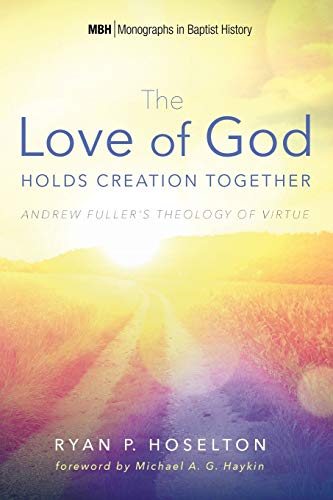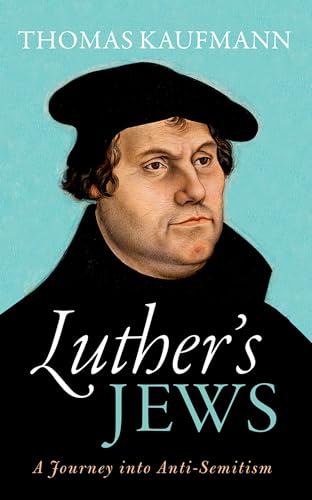The Love of God Holds Creation Together: Andrew Fuller’s Theology of Virtue
Written by Ryan P. Hoselton Reviewed By Stephen A. ReynoldsDuring the last several decades, Andrew Fuller’s (1754–1815) legacy among Evangelicalism has become a popular theme in Baptist scholarship, especially regarding his soteriological influence on the Modern Missionary Movement. This emphasis is merited as Fuller’s evangelical Calvinism remains his foremost contribution to evangelicalism. However, as Ryan Hoselton notes, other areas of Fuller’s theology and practice have yet to be surveyed. This work focuses on one such area: ethics. In its pages, Hoselton adopts the term aretegenic, a neologism coined by Ellen Charry, to describe Fuller’s relationship between virtue and theology. According to Charry, classic theologians such as Augustine of Hippo (354–430) and John Calvin (1509–1564) believed that an accurate knowledge of God “fostered virtue and excellence in the lives of believers” (p. 3). A similar aretegenic theology, Hoselton maintains, materializes throughout Fuller’s theological corpus but develops most evidently in his apologetic works against Socianianism and Deism. Through an examination of these primary works, the author determines that “Fuller rooted morality in right Christian doctrine. A right knowledge of God and human nature grounded a correct knowledge of virtue, and a vital love of God and neighbor facilitated a love of virtue” (pp. 2–3).
Hoselton structures the work around this thesis. In chapter two, the author introduces Fuller’s evangelical Calvinism within his Enlightenment context. Fuller’s soteriology centers on an Edwardsean application of natural and moral inability to human responsibility. Although sinful humanity is morally unable and unwilling to respond to God’s decrees, they remain naturally able and, thus, accountable. This understanding of human depravity and responsibility directly contradicted the optimistic anthropology of most Enlightenment thinkers, including Joseph Priestley (1733–1804), whose Socinian theology emphasized progressive ethics and human capability, and Thomas Paine (1737–1809), who popularized Deism and its rejection of Christianity’s suppression of human potential. After introducing these figures within their Enlightenment context, Hoselton proceeds in chapter three to detail Fuller’s apologetic against both Priestley’s Socinianism (in The Calvinistic and Socinian Systems Examined and Compared, as to Their Moral Tendency [1793, 1802]) and Paine’s Deism (in The Gospel Its Own Witness [1800]). The author highlights Fuller’s use of virtue as a central argument against both systems. True morality, Fuller contends, rests in Christian orthodoxy. Chapter four applies this argument to Fuller’s broader theological system, including the doctrines of God, humanity, redemption, and revelation. Each of these dogmas displays Fuller’s aretegenic approach as “every doctrine of the gospel proved salutary to the lives of believers, rousing a love for God that pervaded the agent’s entire being” (p. 68). In chapter five, Hoselton demonstrates Fuller’s application of doctrine to Christian morality as proof of its truthfulness in comparison to the failure of Enlightenment principles to inspire similar results. The author then concludes with a brief application of Fuller’s aretegenic method to modern virtue ethics.
The greatest strength of Hoselton’s work lies in its charting of new territory in Fullerite scholarship. Unlike any previous study, The Love of God Holds Creation Together demonstrates the effects of Fuller’s evangelical Calvinism far beyond his soteriology and missiology to his ethics. Love and virtue were just as predominant in Fuller’s thought as they were to Jonathan Edwards, his theological predecessor and mentor. Through a scholarly examination of primary sources, Hoselton uncovers this essential function of virtue in Fuller’s polemic against both Socinianism and Deism. As such, the author effectively locates Andrew Fuller within his Enlightenment context beyond the oft-studied immediate setting of High Calvinism. Hoselton’s work introduces the reader to the broader intellectual climate of Fuller’s day.
A few questions remain unanswered by Hoselton’s work, which could be explored by future studies. First, the present study investigates Fuller’s aretegenic approach, primarily in two apologetic works. Although Hoselton briefly discusses the theologian’s most influential work, The Gospel Worthy of All Acceptation, as well as other sermons and writings, other areas of Fuller’s corpus remain uncharted. Deeper study of Fuller’s other polemical works such as those against antinomianism, universalism, and Arminianism could uncover additional insight into his aretegenic theology. Further, Hoselton’s conclusions related to Fuller’s systematic theology can be extended to other doctrines. One could ask, for example, how Fuller roots virtue in the areas of ecclesiology and eschatology, among others. While The Love of God Holds Creation Together leaves these questions unanswered, this detracts little from the overall value of the work. Hoselton has provided a valuable resource for both Baptist studies and Fullerite scholarship. After reading the work, one is left with the impression that this brief monograph is only the starting point for future studies on virtue in the thought and practice of Andrew Fuller.
Stephen A. Reynolds
Stephen A. Reynolds
Gateway Seminary
Ontario, California, USA
Other Articles in this Issue
In appreciation for the recent resurgence of interest in biblical theology and typological interpretation, this article considers Jonathan Edwards’s typological interpretive practices and principles...
The Insights and Shortcomings of Kantian Ethics: Signposts Signaling the Truthfulness of Christian Ethics
by Zachary BreitenbachImmanuel Kant proposed what he considered to be the one true ethical system—a system rooted in pure reason, without recourse to grounding morality in God, that sought to explain universal moral truth...
The Doctrine of Scripture and Biblical Contextualization: Inspiration, Authority, Inerrancy, and the Canon
by Jackson WuThis essay explores the relationship between contextualization and an evangelical doctrine of the Bible, with a special emphasis on biblical inspiration, biblical authority, biblical inerrancy, and the biblical canon...
Can We Hasten the Parousia? An Examination of Matt 24:14 and Its Implications for Missional Practice
by C. J. MooreAmong the many possible motivations for mission participation, the eschatological motivation for missions has recently grown in prevalence...
“Striving for Glory with God”: Humility as the Good Life in Basil of Caesarea’s Homily 20
by Coleman M. FordBasil of Caesarea (c. AD 330–379) presents humility as the essence of the good life in his Homily 20...







